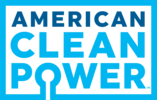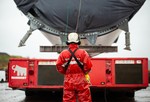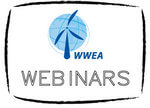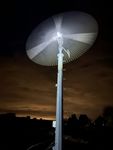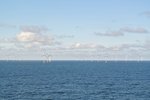News Release from American Clean Power Association (ACP)
Wind Industry Profile of
02/22/2011
AWEA - What About Wind Energy and Electric Vehicles? By Denise Bode, AWEA CEO
From the wind energy industry's perspective, greater electrification of the transportation sector to allow clean, affordable, homegrown wind power to directly power our electric vehicles would be an excellent long-term strategy to reduce America's dependence on imported oil. While wind energy is already significantly reducing air pollution and the fossil fuel dependence of our economy, those savings would be expanded even further if wind power could directly reduce the use of oil in the transportation sector.
Our in-house statistical experts were asked recently to come up with some numbers on what it would take to provide the additional electricity if half of the U.S. auto fleet were composed of plug-in electric hybrid autos or electric cars.
Here's what they told us:
If half of the U.S. car fleet were plug-in hybrid electric vehicles, and were powered by clean wind energy:
- We would avoid the use of over 60 billion gallons of gasoline annually;
- We would use 3 billion fewer barrels of oil annually;
Further, accomplishing this level of oil reduction would require only 143 GW or 82,000 wind turbines.[1] That’s less than 2% of the total wind resource potential in the U.S.
Wind works to produce manufacturing and construction jobs, so using our nation's abundant, homegrown wind energy to power vehicles would be a win-win for our economy and the environment, while at the same time reducing our current dependence on fossil fuels. Growth in the adoption of plug-in electric vehicles would bring thousands of new manufacturing jobs both in wind and in the hard-pressed automobile industry. Additional oil savings could be realized by using natural gas that is produced in an environmentally responsible manner for long-haul trucking, a transportation application for which electric vehicles are not well suited.
Upgrading our aging electric transmission system will be critical in many scenarios, including one with high renewable and high auto electrification. This upgrade would make the entire electric utility system more reliable while also allowing lower-cost wind energy to flow from rural areas around the nation. Wind has already proven itself as a potent rural economic development tool.
In short, the combination of more and better transmission, more wind power, and plug-in electric vehicles will bolster our national security, improve electric reliability, create new manufacturing jobs, save consumers money, and revitalize rural communities. It's hard to think of a policy prescription with a greater range of favorable outcomes.
[1] Assumptions:
- Mid-size sedan PHEV uses 0.30 kWh per mile (versus 0.26 kWh per mile for small sedan)
- Average distance driven: 32 miles per day
- Current Vehicle Fleet:
234,500,000: Cars & Light Duty Vehicles (2-axel/4-wheel)
251,000,000: All vehicles
- Wind assumptions: 35% average capacity factor of new fleet
- Gasoline Consumption: Average MPG of 22.5 miles per gallon (blending car efficiency with other vehicle MPG)
- 20 gallons of gasoline are produced from 1 barrel of oil.
For more information on this article or if you would like to know more about what www.windfair.us can offer, please do not hesitate to contact Errol Stryker at es@windfair.us
www.windfair.net is the largest international B2B Internet platform – ultimately designed for connecting wind energy enthusiasts and companies across the globe!
Our in-house statistical experts were asked recently to come up with some numbers on what it would take to provide the additional electricity if half of the U.S. auto fleet were composed of plug-in electric hybrid autos or electric cars.
Here's what they told us:
If half of the U.S. car fleet were plug-in hybrid electric vehicles, and were powered by clean wind energy:
- We would avoid the use of over 60 billion gallons of gasoline annually;
- We would use 3 billion fewer barrels of oil annually;
Further, accomplishing this level of oil reduction would require only 143 GW or 82,000 wind turbines.[1] That’s less than 2% of the total wind resource potential in the U.S.
Wind works to produce manufacturing and construction jobs, so using our nation's abundant, homegrown wind energy to power vehicles would be a win-win for our economy and the environment, while at the same time reducing our current dependence on fossil fuels. Growth in the adoption of plug-in electric vehicles would bring thousands of new manufacturing jobs both in wind and in the hard-pressed automobile industry. Additional oil savings could be realized by using natural gas that is produced in an environmentally responsible manner for long-haul trucking, a transportation application for which electric vehicles are not well suited.
Upgrading our aging electric transmission system will be critical in many scenarios, including one with high renewable and high auto electrification. This upgrade would make the entire electric utility system more reliable while also allowing lower-cost wind energy to flow from rural areas around the nation. Wind has already proven itself as a potent rural economic development tool.
In short, the combination of more and better transmission, more wind power, and plug-in electric vehicles will bolster our national security, improve electric reliability, create new manufacturing jobs, save consumers money, and revitalize rural communities. It's hard to think of a policy prescription with a greater range of favorable outcomes.
[1] Assumptions:
- Mid-size sedan PHEV uses 0.30 kWh per mile (versus 0.26 kWh per mile for small sedan)
- Average distance driven: 32 miles per day
- Current Vehicle Fleet:
234,500,000: Cars & Light Duty Vehicles (2-axel/4-wheel)
251,000,000: All vehicles
- Wind assumptions: 35% average capacity factor of new fleet
- Gasoline Consumption: Average MPG of 22.5 miles per gallon (blending car efficiency with other vehicle MPG)
- 20 gallons of gasoline are produced from 1 barrel of oil.
For more information on this article or if you would like to know more about what www.windfair.us can offer, please do not hesitate to contact Errol Stryker at es@windfair.us
www.windfair.net is the largest international B2B Internet platform – ultimately designed for connecting wind energy enthusiasts and companies across the globe!
- Source:
- American Wind Energy Association
- Author:
- Posted by Trevor Sievert, Online Editorial Journalist / By Denise Bode, AWEA CEO, www.aweablog.org/
- Email:
- windmail@awea.org
- Link:
- www.awea.org/...
- Keywords:
- AWEA; wind energy, wind power, wind turbine, onshore, offshore, windmill, www.windfair.net, Trevor Sievert, ECA

